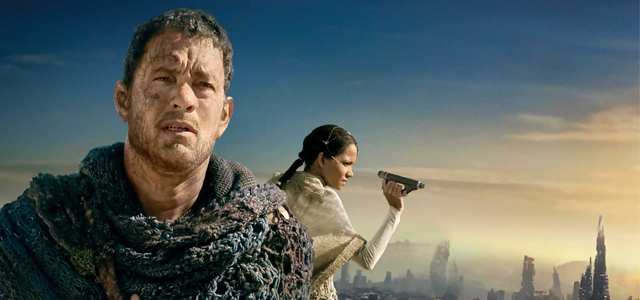(M) Tom Hanks, Halle Berry, Hugo Weaving
Films like this one polarize critics. One person’s indulgent storytelling is another’s cinematic vision.
The Wachowskis are known for waxing lyrical on film. The Matrix trilogy was nothing if not a treatise on the nature of existence. Again, the Wachowskis and director Tom Twyker (Run Lola, Run) are tackling the big questions in Cloud Atlas, based on the best-selling novel by David Mitchell. In this era of sequels and fairy tale reboots, it’s refreshing to see an original, albeit “unfilmable” book, up on the screen.
Six separate stories are contained in the film’s narrative; the earliest is set around 1850 and the most distant is “106 autumns after ‘the Fall’”, an event that the film dates sometime after 2144.
Phrases like “all voices [get] tangled up into one”, that “separation is an illusion”, “death is only a door”, “Why do we keep making the same mistakes over and over?” and “our lives are not our own; we are bound to others, past and present” pepper the film to give a sense of connection.
The film has both spiritual and political points to make but the fact that each segment was directed by either Twyker or The Wachowskis means there’s a change of gears that makes one have to work hard to make the connections in the narrative — this isn’t necessarily a bad thing but it will limit the audience for the film.
Twyker and the Wachowskis (who share screenplay credits as well) suggest some connections by casting the same actors in multiple storylines but after the first hour or so this ends up feeling more like a device than having any thematic purpose.
Taken at face value, each of the six stories in Cloud Atlas have intriguing points to make about society, connection, love, relationships, gender, and what it means to be human in a society that is rapidly evolving without the need for personal connection
Taken at face value, each of the six stories in Cloud Atlas have intriguing points to make about society, connection, love, relationships, gender, and what it means to be human in a society that is rapidly evolving without the need for personal connection. Personally, the segments set in the future in Neo-Seoul were the most narratively interesting as they deal with the nature of humanity in a society given over totally to technology.
One of the most interesting themes in the film is that, despite ourselves, we seem destined to make similar mistakes throughout history. Also evident is that fragments of cultural information inform each new story; giving a sense that, while mistakes are made, change is possible.
It is hard to think of a film in recent memory that has had so much talent involved. With its huge roster of stars cast over the six stories, the talent on display is as confounding as the story itself.
As an experience in filmmaking this is possibly one of the most intriguing entries in a while.
One critic has claimed Cloud Atlas as “a deeply religious movie in search of a theology”, which is an excellent way to both describe its shortcomings and what makes it so interesting and thought-provoking.
Another critic explains the film “strives continually for transcendence and only sometimes grasps it, but the sincerity with which it pursues the emotion and the very idea of the reverberating impact selfless actions can have is quite moving.”
Like The Tree of Life before it, Cloud Atlas is a film that will not be everyone’s cup of java, but it’s an ambitious attempt at storytelling nonetheless.
“By each crime and every kindness, we birth our future.”
Adrian Drayton













